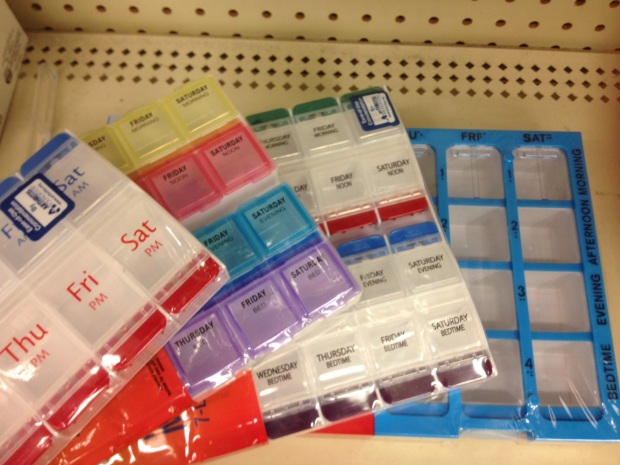Hey Guys!
Ever felt like you’re drowning in pills? Having trouble managing the sheer volume of medication you are expected to ingest every day, let alone remembering which pills need to be taken when, with what, or better yet what NOT to take together? As daunting as it might first appear, taking medication properly is the cornerstone of chronic health management. If you don’t take your pills, you’re not exactly “managing” anything are you?
So, here are some tips to get your pill popping skills en pointe!
1.) Make a list! Now this may seem self-evident, but taking the time to create a detailed list of your medications that you keep UP-TO-DATE will only help to simplify your life in the long run. I know what some of you may be thinking. “I hate lists. I have a great memory. I won’t forget.” Well, as someone who has been taking medication since birth—pancreatic enzymes every time I eat, for example—let me tell you, YOU WILL FORGET. So, unless you have the eidetic memory of Dr. Spencer Reid, write it down.
2.) What to include on your list? You really should have two lists: a current list that you refer to when you are refilling medications; interacting with doctors, insurance providers, pharmacists, and specialty pharmacy personnel (they will ask you what you’re taking, even if the recitation takes 10 minutes because you have 3 pages worth of pills); and a master list that lists every medication that you have taken at some point. This master list should also include what you were taking the medication for, why you discontinued it, and any adverse reactions you had to the medication.
- This may seem excessive, but having suffered through ciprofloxacin-induced diarrhea several times because I was too lazy to keep track of what antibiotics I had been prescribed previously, and had thus made me ill, I can attest to the life saving—or gut-saving—power of the master list.
- Also, the master list is a great resource for remembering allergies. Many allergies develop due to repeated exposure, therefore what was initially a mild reaction could turn into potentially deadly anaphylaxis the second go-around.
- The current list should be detailed in its own way: when medication should be taken, if it should not be taken with certain foods or other medications, etc., if the medication is not in pill-form—or is used for break-through symptoms—how often it can be taken in a 24 hour span. An example of this would be an asthma inhaler.
3.) Digitize It! Now, you’ve taken the time to write it all down. However, I doubt many of you want to carry around a sheaf of papers detailing that time you had ringing in the ears and an itchy arsehole due to medication X. So, the next step is to input the most relevant parts of the list into a word doc, excel spreadsheet, or, my personal favorite, a pill tracker app. The iPhone iOS software now comes standard with a Medical ID in the Health app where you can keep medical conditions, medical notes (e.g. you have a port-a-cath), allergies and reactions, medications, and emergency contacts. Or, you can surf the app store for one that fits your specific needs. I have a CF specific app called My Fight Against Cystic Fibrosis that allows me to set up daily pill reminders.
4.) Organize Your Pills: Choosing the Right Pill Keeper Pill keepers come in many shapes and sizes, but finding the one that works for you is really dependent on your pill regimen. Are you taking pills once a day? Twice a day? With every meal? Every 4 hours? Are your pills small or large? Refer to the list. Then, put the right pills in the right slot. It’s pretty simple.

Types of Pill Keepers
Photo Courtesy of tr0tt3r @ flickr.com
5.) Take Your Pills. You’ve done all the hard work of organizing them. Now, you just have to take them. Even with all this preparation, you are still going to miss a pill on occasion. Realize you’ve done so, and then let yourself off the hook. However, if you find yourself missing pills more than you are taking them, I would revisit the pill tracker app. Maybe you need a more in-depth app that forces you to put in that you’ve actually taken the medication, rather than just beeping when you need to pop a pill. Find out what works for you, and let me know what tips and tricks you’ve found success with!
And remember, take it one breath at a time.


